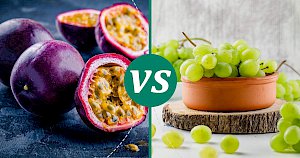Grapes vs Passion Fruit: Nutrition & Calories Compare


Grape vs Passion fruit
Nutrition Facts
Serving size:
change
5g10g15g20g30g40g50g60g80g100g120g140g160g180g200g220g250g300g350g400g450g500g600g700g800g900g1000g
1oz2oz3oz4oz5oz6oz7oz8oz10oz12oz15oz20oz25oz30oz35oz40oz50oz
Amount Per Serving:
Serving size:
change
5g10g15g20g30g40g50g60g80g100g120g140g160g180g200g220g250g300g350g400g450g500g600g700g800g900g1000g
1oz2oz3oz4oz5oz6oz7oz8oz10oz12oz15oz20oz25oz30oz35oz40oz50oz
Amount Per Serving:
Grape vs Passion Fruit 100g Compare
| per 100g | Grapes | Passion fruit |
|---|---|---|
| Calories | 67 | 97 |
| Carbohydrates | 17.15 g | 23.38 g |
| Fat | 0.35 g | 0.7 g |
| Dietary fiber | 0.9 g | 10.4 g |
| Protein | 0.63 g | 2.2 g |
| Calcium | 14 mg | 12 mg |
| Iron | 0.29 mg | 1.6 mg |
| Magnessium | 5 mg | 29 mg |
| Potassium | 191 mg | 348 mg |
| Vitaminium A | 100 µg | 1274 µg |
| Vitaminium B2 (riboflavin) | 0.057 mg | 0.13 mg |
| Vitaminium B3 (Niacin) | 0.3 mg | 1.5 mg |
| Vitaminium B6 | 0.11 mg | 0.1 mg |
| Vitaminium B9 (Folic acid) | 0.004 mg | 14 mg |
| Vitaminium C | 4 mg | 30 mg |
| Vitaminium E | 0.19 mg | 0.02 mg |
| Vitaminium K | 0.015 µg | 0.7 µg |
| Beta karoten | 39 mg | 743 mg |
Grapes and Passion Fruit: A Juicy Comparison
When it comes to choosing between grapes and passion fruit, it's not just about the taste. Both of these fruits bring a burst of flavors and a wealth of nutritional benefits to the table. Grapes, with their sweet and tart taste, have been savored around the world for centuries. On the other hand, passion fruit, with its exotic flavor and aromatic seeds, offers a tropical twist to any diet. But beyond their unique tastes, how do these fruits compare in terms of calories, nutrition, and health benefits?
Caloric Content and Nutritional Profile
At first glance, one might notice the difference in caloric content: grapes contain approximately 69 calories per 100 grams, while passion fruit has a slightly higher count at 97 calories for the same serving size. However, this difference is balanced out by the rich fiber content in passion fruit, boasting 10.4 grams compared to grapes' 0.9 grams. This high fiber content in passion fruit can aid in digestion and promote a feeling of fullness, contributing to weight management.
When it comes to macronutrients, passion fruit also leads with higher amounts of protein and healthy fats, offering 2.2 grams of protein and 0.7 grams of fat, compared to grapes' 0.72 grams of protein and 0.16 grams of fat. Although both fruits are low in fat, the slight edge in protein and fiber in passion fruit makes it an excellent choice for those looking to add more nutrient-dense foods to their diet.
Vitamins and Minerals Galore
Both grapes and passion fruit are packed with vitamins and minerals, but passion fruit particularly shines in its vitamin A and C content, offering 1274 IU of vitamin A and 30 mg of vitamin C, significantly higher than grapes. These vitamins are crucial for maintaining good vision, skin health, and immune function. Additionally, passion fruit provides a good source of iron and magnesium, essential minerals for energy production and bone health.
Grapes, while lower in these specific vitamins and minerals, still provide a variety of nutrients including vitamin K, essential for blood clotting, and antioxidants like beta-carotene and vitamin E. They also offer a unique compound called resveratrol, known for its heart-healthy benefits.
Which One to Choose?
Ultimately, the choice between grapes and passion fruit depends on personal preference and nutritional goals. For those looking to increase their fiber intake or seeking a higher protein and vitamin-rich option, passion fruit might be the way to go. However, grapes can be a delicious way to enjoy a low-calorie snack with the added benefits of antioxidants and heart-healthy compounds.
Whether you choose the sweet and tangy taste of grapes or the tropical flair of passion fruit, incorporating these fruits into your diet can add a burst of flavor and a boost of nutrition. Enjoy them fresh, in fruit salads, smoothies, or as a topping on your favorite desserts. The versatility and health benefits of both grapes and passion fruit make them excellent additions to a balanced diet.
Grapes 100g
67kcalCalories source
- 92% CARBS.
- 3% PROTEIN
- 4% FAT
Passion fruit 100g
97kcalCalories source
- 86% CARBS
- 8% PROTEIN
- 6% FAT
Compares of grape
- Grape vs Apple
- Grape vs Apricot
- Grape vs Avocado
- Grape vs Banana
- Grape vs Blackcurrants
- Grape vs Blueberries
- see all compares of grape
Marcin Piotrowicz
calories-info.com creator
Healthy diet and healthy lifestyle promoter
Add comment